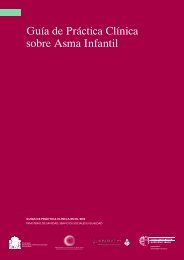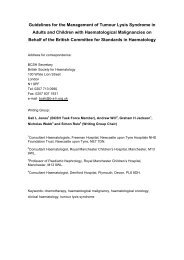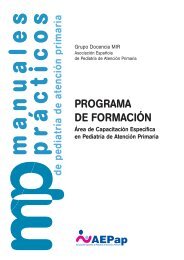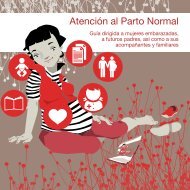- Page 1 and 2:
Comparative Effectiveness Review Nu
- Page 3 and 4:
This report is based on research co
- Page 5 and 6:
Acknowledgments The authors gratefu
- Page 7 and 8:
Peer Reviewers Prior to publication
- Page 9 and 10:
BCI; moderate SOE for effects of pr
- Page 11 and 12:
Overview of the Literature ........
- Page 13 and 14:
Executive Summary Introduction Infa
- Page 15 and 16:
for contextual questions as few eff
- Page 17 and 18:
Figure B. Analytic framework for KQ
- Page 19 and 20:
Table A. Inclusion criteria (contin
- Page 21 and 22:
precision (precise, imprecise), and
- Page 23 and 24:
Figure D. Estimates of expected IH
- Page 25 and 26:
majority of studies to date have in
- Page 27 and 28:
effectiveness outcomes. The evidenc
- Page 29 and 30:
changes. We considered the strength
- Page 31 and 32:
Table C. Summary of evidence in stu
- Page 33 and 34:
Table C. Summary of evidence in stu
- Page 35 and 36:
Table C. Summary of evidence in stu
- Page 37 and 38:
Table D. Summary of evidence in stu
- Page 39 and 40:
Applicability We set inclusion crit
- Page 41 and 42:
quantitative meta-analyses. Researc
- Page 43 and 44:
surgically. Lesion characteristics
- Page 45 and 46:
References 1. Wassef M, Blei F, Ada
- Page 47 and 48:
39. Yu L, Li S, Su B, et al. Treatm
- Page 49 and 50:
modalities. The questions of imagin
- Page 51 and 52:
KQ2. Among newborns, infants, and c
- Page 53 and 54:
of data, and compiling evidence. We
- Page 55 and 56:
We only included studies published
- Page 57 and 58:
a standardized form (Appendix B) th
- Page 59 and 60:
Determining Quality Ratings • We
- Page 61 and 62:
Results We present results for Cont
- Page 63 and 64:
defects, urogenital anomalies, ulce
- Page 65 and 66:
Results of Literature Searches for
- Page 67 and 68:
Table 3. Characteristics of include
- Page 69 and 70:
scans, had a sensitivity of 20 perc
- Page 71 and 72:
of the model fit to all studies, bu
- Page 73 and 74:
Detailed Analysis Effectiveness of
- Page 75 and 76:
Table 6. Key resolution outcomes in
- Page 77 and 78:
with prednisolone included endocrin
- Page 79 and 80:
children in 8 studies), skin atroph
- Page 81 and 82:
hypopigmentation, impaired wound he
- Page 83 and 84:
fair quality for effectiveness outc
- Page 85 and 86:
studies of nadolol and atenolol. No
- Page 87 and 88:
Table 10. Key resolution outcomes i
- Page 89 and 90:
old. 100 Thirty percent of children
- Page 91 and 92:
Table 11. Resolution outcomes in st
- Page 93 and 94:
Table 11. Resolution outcomes in st
- Page 95 and 96:
Table 13. Resolution outcomes in st
- Page 97 and 98:
Table 15. Key outcomes in studies c
- Page 99 and 100:
Table 16. Resolution outcomes in st
- Page 101 and 102:
Table 18. Resolution outcomes in st
- Page 103 and 104:
Table 19. Key resolution outcomes i
- Page 105 and 106:
Table 21. Resolution outcomes in st
- Page 107 and 108:
Table 22. Harms/adverse effects in
- Page 109 and 110:
Table 24. Adverse effects in case s
- Page 111 and 112:
Table 24. Adverse effects in case s
- Page 113 and 114:
• In two RCTs reporting level of
- Page 115 and 116:
Table 25. Key resolution outcomes i
- Page 117 and 118:
Table 26. Key resolution outcomes i
- Page 119 and 120:
Nd:YAG Laser With Cooling Compared
- Page 121 and 122:
Table 30. Key resolution outcomes i
- Page 123 and 124:
long term follow information was av
- Page 125 and 126:
Discussion State of the Literature
- Page 127 and 128:
Table 34. Strength of evidence for
- Page 129 and 130:
Table 35. Strength of evidence for
- Page 131 and 132:
Effectiveness and Harms of Beta-Blo
- Page 133 and 134:
Table 36. Strength of evidence for
- Page 135 and 136:
Table 36. Strength of evidence for
- Page 137 and 138:
Table 37. Strength of evidence for
- Page 139 and 140:
Table 37. Strength of evidence for
- Page 141 and 142:
Table 38. Strength of evidence for
- Page 143 and 144:
Table 38. Strength of evidence for
- Page 145 and 146:
Table 39. Strength of evidence for
- Page 147 and 148:
Table 39. Strength of evidence for
- Page 149 and 150:
older children. One comparative stu
- Page 151 and 152:
case series reporting on rarer pres
- Page 153 and 154:
agents is critical, especially as u
- Page 155 and 156:
References 1. Wassef M, Blei F, Ada
- Page 157 and 158:
39. Chen TS, Eichenfield LF, Friedl
- Page 159 and 160:
80. Mai HM, Zheng JW, Wang YA, et a
- Page 161 and 162:
119. Sharma LK, Dalal SS. Corticost
- Page 163 and 164:
162. Snir M, Reich U, Siegel R, et
- Page 165 and 166:
198. Chen ZG, Zheng JW, Yuan ML, et
- Page 167 and 168:
237. Healy G, McGill T, Friedman EM
- Page 169 and 170:
Abbreviations and Acronyms Used in
- Page 171 and 172:
Appendix A. Search Strategies Searc
- Page 173 and 174:
Searches for Comparative Effectiven
- Page 175 and 176:
Appendix B. Screening and Quality A
- Page 177 and 178:
Harms Risk of Bias Assessment Form
- Page 179 and 180:
QUADAS Diagnostic Accuracy Rating T
- Page 181 and 182:
Infantile Hemangioma CER: Risk of B
- Page 183 and 184:
20. Grundfest-Broniatowski S, Carey
- Page 185 and 186:
65. Dachman AH, Lichtenstein JE, Fr
- Page 187 and 188:
111. Yoshida T, Kuratomi K, Mitsuma
- Page 189 and 190:
160. Newman SL, Goodwin CD. Colonic
- Page 191 and 192:
204. Crockett DM, Healy GB, McGill
- Page 193 and 194:
253. Wright GL, Smith RJ, Katz CD,
- Page 195 and 196:
301. Paley D, Jackson RW. Synovial
- Page 197 and 198:
346. Dombrowski MP, Budev H, Wolfe
- Page 199 and 200:
390. Stringel G. Giant hemangioma:
- Page 201 and 202:
436. Liu HC, Chang MH, Lue HC, et a
- Page 203 and 204:
480. Casale AJ, Menashe DS. Massive
- Page 205 and 206:
526. Taylor RS, Joseph DB, Kohaut E
- Page 207 and 208:
571. Goldstein MH. The elastic flap
- Page 209 and 210:
614. Salloum E, Flamant F, Caillaud
- Page 211 and 212:
659. Fellows KE, Hoffer FA, Markowi
- Page 213 and 214:
706. Weatherford DA, Abrams RS, Wal
- Page 215 and 216:
749. Keleti D, Flickinger JC, Hobso
- Page 217 and 218:
793. Van Campenhout I, Patriquin H.
- Page 219 and 220:
836. Goldman MP, Fitzpatrick RE, Ru
- Page 221 and 222:
880. Schulman SR, Jones BR, Slotnic
- Page 223 and 224:
924. Egawa H, Berquist W, Garcia-Ke
- Page 225 and 226:
968. Thompson DN, Taylor WF, Haywar
- Page 227 and 228:
1013. Gregg CM, Wiatrak BJ, Koopman
- Page 229 and 230:
1056. Rozylo TK, Krupski W, Galkows
- Page 231 and 232:
1099. Fremont S, Kanny G, Bieber S,
- Page 233 and 234:
1142. Sreeram N, Miller P, John P.
- Page 235 and 236:
1185. Enjolras O, Wassef M, Mazoyer
- Page 237 and 238:
1228. Paley MR, Farrant P, Kane P,
- Page 239 and 240:
1271. Burrows PE, Robertson RL, Mul
- Page 241 and 242:
1312. Lezama-del Valle P, Gerald WL
- Page 243 and 244:
1352. Altunay IK, Gokdemir G, Koken
- Page 245 and 246:
1394. Kiristioglu I, Kilic N, Gurpi
- Page 247 and 248:
1437. Yoshida D, Sugisaki Y, Shimur
- Page 249 and 250:
1480. Kreusel KM, Bechrakis NE, Hei
- Page 251 and 252:
1523. Wilken JJ, Meier FA, Kornstei
- Page 253 and 254:
1568. Garmendia G, Miranda N, Borro
- Page 255 and 256:
1610. Park EA, Seo JW, Lee SW, et a
- Page 257 and 258:
1652. Chatrath P, Black M, Jani P,
- Page 259 and 260:
1694. Hopf M, Hopf JUG, Rohde E, et
- Page 261 and 262:
1737. Rozylo-Kalinowska I, Brodzisz
- Page 263 and 264:
1782. Coras B, Hohenleutner U, Land
- Page 265 and 266:
1826. McQueen CT, Cullen RD. Endosc
- Page 267 and 268:
1866. Tsao MN, Schwartz ML, Bernste
- Page 269 and 270:
1909. Denier C, Labauge P, Brunerea
- Page 271 and 272:
1950. Mounayer C, Benndorf G, Bisdo
- Page 273 and 274:
1992. Woo SJ, Kim CJ, Yu YS. Cavern
- Page 275 and 276:
2036. Ersoy S, Mancini AJ. Hemifaci
- Page 277 and 278:
2077. Kronenberg A, Blei F, Ceisler
- Page 279 and 280:
2117. Sabharwal GK, Strouse PJ. Pos
- Page 281 and 282:
2159. Cannady SB, Kahn TA, Trabouls
- Page 283 and 284:
2200. Karikari IO, Selznick LA, Cum
- Page 285 and 286:
2241. Pienaar C, Graham R, Geldenhu
- Page 287 and 288:
2283. Wananukul S, Voramethkul W, N
- Page 289 and 290:
2327. Czernik A, Bystryn JC. Does i
- Page 291 and 292:
2368. Kamida T, Takeda Y, Fujiki M,
- Page 293 and 294:
2410. Rodgers B, Zeim S, Crawford B
- Page 295 and 296:
2453. Zolkipli Z, Aylett S, Rankin
- Page 297 and 298:
2495. Egberts F, Mentzel T, Leuschn
- Page 299 and 300:
2537. Kutluhan A, Bozdemir K, Ugras
- Page 301 and 302:
2580. Saetti R, Silvestrini M, Cutr
- Page 303 and 304:
2620. Yun TJ, Na DG, Kwon BJ, et al
- Page 305 and 306:
2661. Demirci H, Shields CL, Eagle
- Page 307 and 308:
2700. Iriz A, Durmaz E, Akmansu SH,
- Page 309 and 310:
2744. Ooi KG, Wenderoth JD, Francis
- Page 311 and 312:
2786. Tyzio R, Khalilov I, Represa
- Page 313 and 314:
2827. Bayliss SJ, Berk DR, Van Hare
- Page 315 and 316:
2869. Fernandez-Pineda I, Lopez-Gut
- Page 317 and 318:
2910. Kazim SF, Bhatti, Enam SA. In
- Page 319 and 320:
2953. Nonogaki S, Campos HGA, Butug
- Page 321 and 322:
2995. Storch CH, Hoeger PH. Propran
- Page 323 and 324:
3038. Al Dhaybi R, Superstein R, Mi
- Page 325 and 326:
3080. del Pozo J, Lopez-Gutierrez J
- Page 327 and 328:
3120. Guye E, Chollet-Rivier M, Sch
- Page 329 and 330:
3159. Kolokythas A, Al-Ghamian H, M
- Page 331 and 332:
3201. Nale P. Propranolol treatment
- Page 333 and 334:
3243. Soltani AM, Reinisch JF. Algo
- Page 335 and 336:
3286. . Derm Dx. Clinical Advisor.
- Page 337 and 338:
3326. Chang YT, Lin JY, Lee JY, et
- Page 339 and 340:
3367. Gross BC, Janus JR, Orvidas L
- Page 341 and 342:
3407. Kupeli S. Use of propranolol
- Page 343 and 344:
3448. Raches D, Hiscock M, Chapiesk
- Page 345 and 346:
3490. Traivaree C, Lumkul R, Torcha
- Page 347 and 348:
3532. Ammerman RT, Putnam FW, Altay
- Page 349 and 350:
3573. Chou S, Subramanian V, Lau HM
- Page 351 and 352:
3614. Hyland RM, Komlosi K, Alleman
- Page 353 and 354:
3655. Masetti R, Colecchia A, Ronde
- Page 355 and 356:
3693. Parikh SR, Darrow DH, Grimmer
- Page 357 and 358:
3732. Stiles JM, Amaya C, Rains S,
- Page 359 and 360:
3772. Zou HX, Jia J, Zhang WF, et a
- Page 361 and 362:
3813. Deng X, Wang K, Wu L, et al.
- Page 363 and 364:
3851. Khorsand K, Backus S, Sidbury
- Page 365 and 366:
3890. Phillips RJ, Lokmic Z, Crock
- Page 367 and 368:
3930. Weil AG, Bhatia S. Resection
- Page 369 and 370:
3969. Ravenscroft J. Management of
- Page 371 and 372:
where ΦΦ(xx) is the cumulative di
- Page 373 and 374:
Figure D-1. Estimates of expected I
- Page 375 and 376:
Figure D-3. Posterior SUCRA estimat
- Page 377 and 378: Figure D-5. Network diagram of comp
- Page 379 and 380: Appendix E. Study Design Classifica
- Page 381 and 382: Author, Year Hogeling 2011 10 Alloc
- Page 383 and 384: Author, Year Representativeness of
- Page 385 and 386: Author, Year Were the harms predefi
- Page 387 and 388: Author, Year Were the harms predefi
- Page 389 and 390: Author, Year Were the harms predefi
- Page 391 and 392: Author, Year Were the harms predefi
- Page 393 and 394: Author, Year Were the harms predefi
- Page 395 and 396: Author, Year Were the harms predefi
- Page 397 and 398: 25. Qiu Y, Ma G, Yang J, et al. Imi
- Page 399 and 400: 56. Hassan BA, Shreef KS. Propranol
- Page 401 and 402: 88. Chakkittakandiyil A, Phillips R
- Page 403 and 404: 120. Pandey A, Gangopadhyay AN, Gop
- Page 405 and 406: Appendix G. Applicability Tables Ta
- Page 407 and 408: Appendix H. Harms Reported in Packa
- Page 409 and 410: o Acquired (autoimmune) hemolytic a
- Page 411 and 412: o Ankylosing spondylitis o Dermatom
- Page 413 and 414: H-7 • Increased dosage of rapidly
- Page 415 and 416: Elocon® (mometason e furoate) 11 T
- Page 417 and 418: Timoptic® (timolol maleate) 15 Tim
- Page 419 and 420: Harms Data for Medications Included
- Page 421 and 422: Table H-3: Adverse Events from Flo-
- Page 423 and 424: (
- Page 425 and 426: thromboembolism, thrombophlebitis,
- Page 427: grades): 103 (48%), erosion/ulcerat
- Page 431 and 432: Discontinuations Patients utilizing
- Page 433 and 434: ocular irritation including blephar







